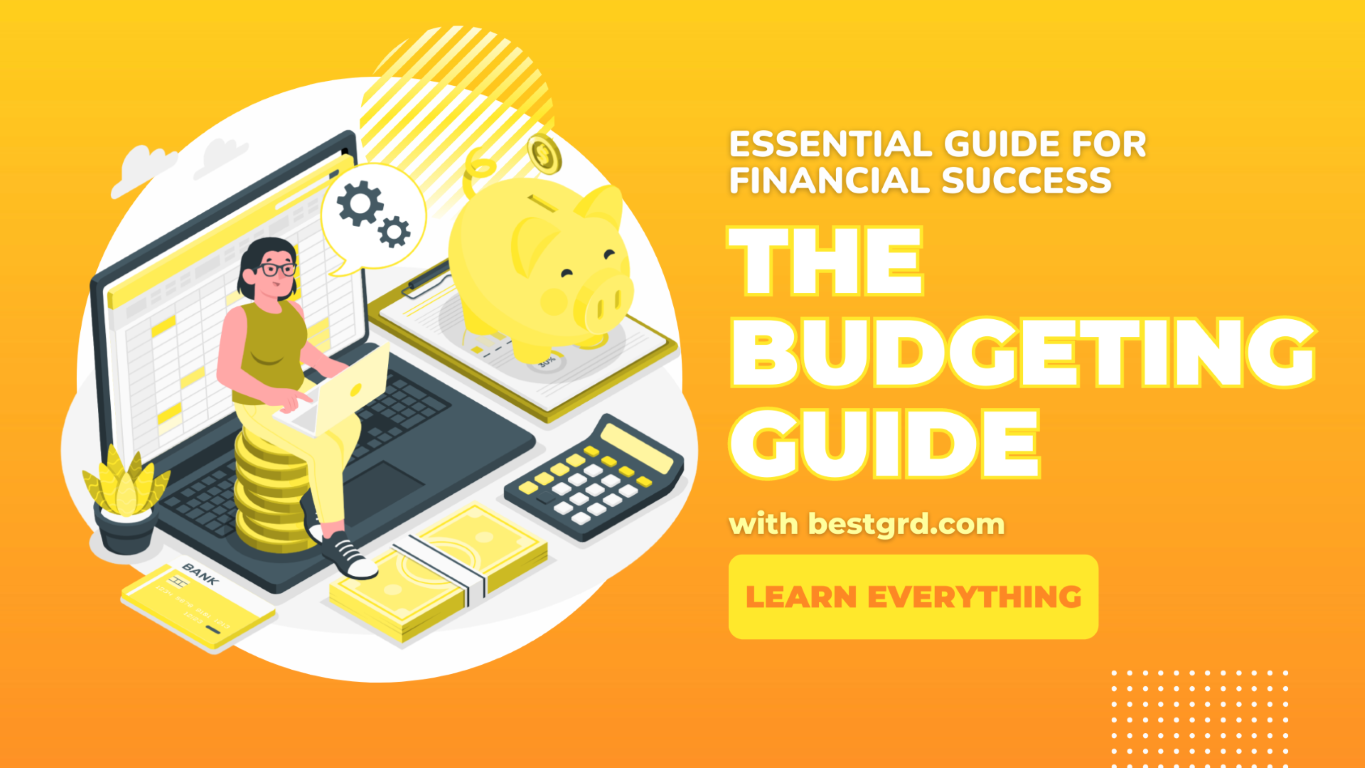Introduction
Budgeting is an important financial skill that is necessary for efficient money management. Yet for many people, coming up with and following a budget may be a difficult undertaking. A pillar page on budgeting might be quite beneficial in this situation.
A pillar page is a large, long-form piece of material that covers a certain topic in depth. The goal of a pillar page is to offer the reader a complete understanding of the subject. And to direct them to further relevant sources of information.
This pillar page will act as your comprehensive budgeting manual. Covering everything from the basics to more sophisticated strategies.
The process of developing a financial plan. It requires first managing your income, expenses, and financial objectives. And then establish a strategy to divide your money as best as possible. It can help you pay off debt, save for the future, and achieve your financial goals.
In this pillar page, we will cover the following topics in detail:
- What is budgeting and why is it important?
- Creating a budget: How to get started?
- Types of budgets: Which one is right for you?
- Tips for sticking to your budget
- Advanced budgeting techniques: Strategies for maximizing your savings
- Common budgeting mistakes to avoid
- Tools and resources for budgeting
This pillar page helps you develop your financial skills & reach your financial goals. Whether you are new to budgeting or a seasoned pro. Well, let’s get this party started!
Definition of Budgeting
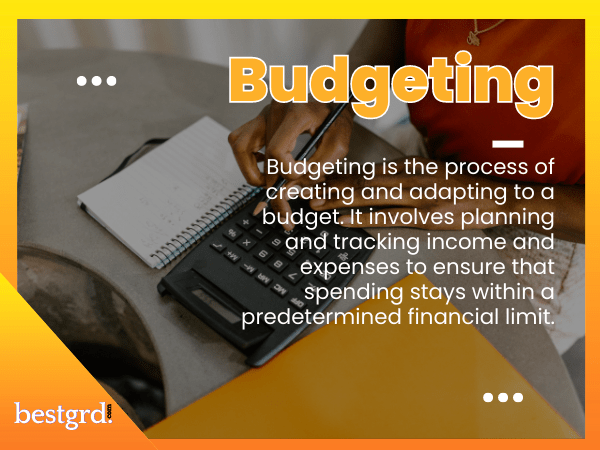
It is the process of making a financial plan. Defining your sources of income, estimating your expenses, and developing a strategy to divide your money.
The purpose of budgeting is to help you reach your financial goals. Whether they are to pay off debt, save for the future, or invest for retirement.
Budgeting is a key financial skill that can help you get control of your finances and make informed financial decisions.
By making a budget, you can get a better knowledge of your spending habits. Find areas where you can save money, and manage your financial goals.
Depending on your unique circumstances and financial goals, budgeting can take many shapes. Some people like a thorough, line-by-line budget that accounts for every dollar spent. Others prefer a flexible approach that allows them to make modifications as needed.
Budgeting, regardless of approach, is a necessary tool for achieving financial success. By setting and following a budget, you can ensure that your money is being spent. And that you are progressing toward your financial goals.
Importance of Budgeting
Budgeting is an important financial skill. That can help you get control of your finances & reach your financial objectives. Following are some of the most important reasons for budgeting:

Helps you Track your Spending
It allows you to keep track of your spending since it gives you a clear picture of your income and costs. You can uncover areas where you may be overspending by tracking your spending.
Helps in Focusing your Spending
Setting a budget allows you to focus your spending & dedicate your money to the most important to you. This can help you meet your financial goals more quickly and efficiently.
Helps you Save Money
It can assist you in saving money by identifying places where you can cut costs. You may prevent overspending and make sure you have adequate money set aside for savings by adhering to your budget.
Helps you Avoid Debt
It can assist you in avoiding debt by ensuring that you live within your means. You may avoid overspending and avoidable debt by developing and keeping to a budget.
Helps you Plan for the Future
You can plan for future expenses such as large purchases, vacations, or retirement by developing a budget. This can assist you in avoiding financial hardship and preparing for the future.
To summarise, budgeting is necessary. Because it enables you to get control of your finances, organize your spending, save money, avoid debt, and plan for the future.
You may meet your financial objectives and enhance your financial well-being by developing and sticking to a budget.
Benefits of Budgeting
Budgeting is a strong tool that can give many benefits to your financial well-being. Following are some of the primary advantages of budgeting:

Helps you Achieve your Financial Goals
Making a budget allows you to focus your spending and dedicate your money to the things that are most important to you. This can help you meet your financial objectives more quickly and efficiently.
Helps you Identify Areas for Improvement
By tracking your spending and reviewing your budget, you can uncover areas where you may be overspending or where you can cut back. This can help you make better financial decisions and enhance your entire financial status.
Helps you Avoid Unnecessary Debt
You can prevent amassing unneeded debt by living within your means and avoiding overspending. This can help you improve your credit score and lessen financial stress.
Helps you Save Money
You can save money and improve your financial status by identifying places where you can cut back on spending. This might also help you save for an emergency and plan for unforeseen expenses.
Helps you Reduce Financial Stress
You may avoid financial stress and uncertainty by developing and sticking to a budget. This can give you a sense of financial control and stability.
Helps you make Informed Financial Decisions
You can make better financial decisions if you track your expenditures and analyze your budget. This might help you avoid impulsive purchases and make the best use of your money.
Ultimately, budgeting can give many advantages to your financial well-being. By creating a budget and sticking to it, you can achieve your financial goals, and identify areas for improvement. Avoid unnecessary debt, save money, reduce financial stress, and make informed financial decisions.
Creating a Budget: How to Get Started?
Creating a budget may appear to be a hard process, but it is a necessary step towards financial security and achieving your financial goals:
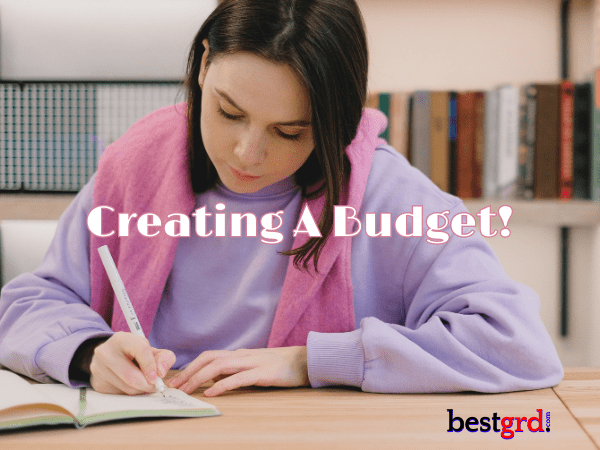
Determine your Income
The first step in developing a budget is determining how much money comes in each month. This covers your salary, any bonuses or commissions, and any extra income streams.
Identify your Expenses
The following step is to list all your expenses. This includes both fixed and variable expenses. Rent or mortgage payments, car payments, insurance premiums, groceries; entertainment, and clothing.
Set Financial Goals
Setting financial objectives is essential if you have a firm picture of your income and expenses. This could include debt repayment, saving for a down payment on a house, or establishing an emergency fund.
Allocate your Money
You can distribute your money according to your income, expenses, and financial goals. Deciding how much money to spend in each category and setting spending limits for yourself to stay within your budget.
Track your Spending
Tracking your spending on a regular basis will help you stay on track with your budget. This can be done manually with a spreadsheet or automatically using a budgeting tool that tracks your transactions.
Make Adjustments as Needed
Budgeting is a procedure that requires flexibility and the ability to make changes as needed. If you discover that you are constantly overpaying in a certain category. You may need to tweak your budget or find strategies to reduce your expenses.
Ultimately, creating a budget is a vital step towards financial security and reaching your financial goals.
Determine your income, identify your costs, define financial goals, allocate your money, track your spending, and make changes as needed. To create a budget that works for you and helps you attain your financial goals.
Types of Budgets: Which One is Right for You?
Budgets come in a variety of forms that you can use to manage your money. Each budgeting plan has a unique approach that may be modified to your personal needs and financial situation. Following are some of the most common budget types:
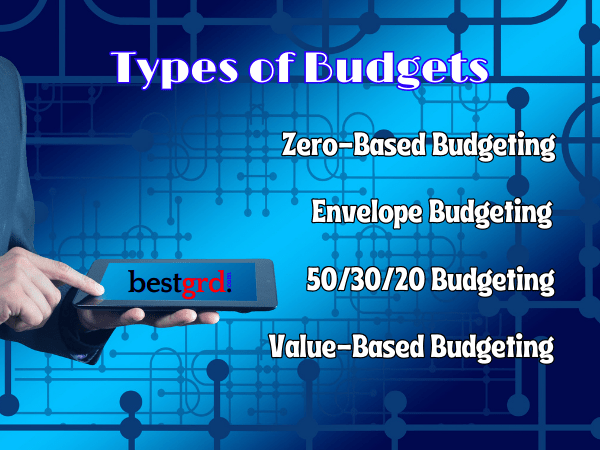
Zero-Based Budgeting
Zero-based budgeting is a budgeting strategy in which you begin with no money and divide it into your spending and financial goals.
This means that every dollar you earn has a specific purpose, such as paying bills, saving for retirement, or spending on non-essentials. Zero-based budgeting can assist you in prioritizing your spending and eliminating unnecessary costs.
50/30/20 Budgeting
The 50/30/20 budgeting strategy allocates 50% of your income to needs, 30% to discretionary expenses, and 20% to savings and debt repayment.
This budgeting technique can help you balance your spending and saving goals while allowing for some spending.
Envelope Budgeting
In envelope budgeting, you assign money to certain categories and place cash in individual envelopes for each area. This allows you to watch how much money is left for each area and avoid overspending. Envelope budgeting can be especially beneficial for persons who overspend on discretionary expenses.
Value-Based Budgeting
Value-based budgeting is a budgeting strategy in which your expenditure is prioritized based on your values and goals.
This means you prioritize your spending on the things that are most important to you and reduce spending on items that do not in line with your beliefs.
It can help you create a spending plan that aligns with your goals, leading to a more rewarding lifestyle and meaningful time.
To conclude, there are various budgets that you can use to manage your money. The goal is to identify and stick to a budgeting plan that works for you and your financial position.
Tips for Sticking to Your Budget
Making a budget is an essential part of financial stability and reaching your financial objectives. But, keeping to a budget might be difficult. Here are some budgeting strategies to help you keep on track:
Track Your Spending
One of the most crucial pieces of budgeting advice is to keep track of your spending. This entails recording all your costs and comparing them to your budget. Budgeting applications & spreadsheets help you keep track of your expenditures and stay organized.
Use Cash Instead of Credit Cards
Using cash rather than credit cards will assist you in staying within your budget and avoiding overpaying. When you use cash, you can see how much money is left for each area and resist the temptation to overpay on discretionary purchases.
Avoid Impulsive Purchases
Your budget can be easily impacted by impulsive purchases. Make a list of the things you need before you go shopping and stick to it to prevent impulse purchases. Moreover, wait a few days before making a significant purchase to ensure that you can afford it and that you actually need it.
Make Adjustments as Needed
Finally, be ready to change your budget as necessary. Because life is erratic, unforeseen bills occasionally occur. Find strategies to make savings in other areas if you go over budget in one department. Don’t be hesitant to change your budget as needed to keep it feasible and practical.
Finally, sticking to a budget is important to maintain financial stability and reach your financial goals. By keeping track of your expenses, paying with cash instead of credit cards, and avoiding impulsive purchases. And making the required changes, you may stick to your spending plan and achieve your financial goals.
Common Budgeting Mistakes to Avoid
Budgeting is an essential tool for establishing financial stability and reaching financial goals. There are, however, errors that people frequently make.
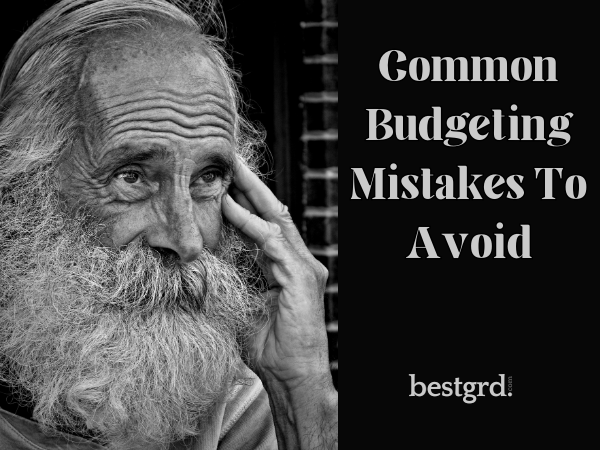
Not Tracking Your Spending
Not keeping track of your spending is one of the most frequent budgeting errors. You can’t tell if you’re spending within your means or going beyond without keeping track of your spending. To get a complete view of your spending patterns, make sure to log every expense, no matter how minor.
Failing to Plan for Unexpected Expenses
Unexpected costs can easily throw a budget off course. It’s crucial to prepare for these costs by setting up an emergency fund or adding a cushion to your budget for unforeseen expenses. By doing this, you’ll be able to avoid taking on debt or using your funds to cover unforeseen costs.
Being Too Strict With Your Budget
Although sticking to your budget is crucial, being too strict may generate excessive stress. And make it difficult to stay within your budget in the long run.
Be honest with your spending plan and allow for some room to account for unexpected expenses or changes in your financial situation.
Forgetting to Celebrate Your Successes
No matter how modest, celebrating your financial victories will help you stay inspired and motivated. Remember to celebrate when you reach a financial objective or follow your spending plan for a specified period of time.
You can stick to your spending plan and reach your financial objectives with the aid of this encouraging feedback. Finally, by avoiding common budgeting mistakes. You can achieve financial stability & achieve financial goals.
By keeping track of your spending, planning for unexpected expenses, and being practical with your spending. And celebrating your success, you can create a budget that works for you and aids in your financial success.
Tools and Resources for Budgeting
Although developing a budget might be difficult, there are numerous tools and resources available to assist you. Some of the best tools and resources for budgeting are listed below:
Budgeting Apps
Using budgeting apps is a wonderful method to keep track of your spending and stick to your spending plan. Many free apps come with tools like expense tracking, bill reminders, and financial goal planning. You Need a Budget, PocketGuard and Mint are some of the well-known applications (YNAB).
Personal Finance Books
There are several books on personal finance that you may read to learn more about setting up a budget, saving money, and making investments. These books might offer insightful advice on how to manage your money and succeed financially.
Some popular personal finance books include
“The Total Money Makeover” by Dave Ramsey,
“Your Money or Your Life” by Vicki Robin and Joe Dominguez,
“The Simple Path to Wealth” by JL Collins.
Financial Advisors
A financial advisor might be a helpful resource. If you need specialized budgeting and financial planning help or guidance.
Financial consultants can offer advice on setting up a budget, making investments, planning for retirement, and other topics. They can also assist you in developing a financial strategy that is unique to your requirements and objectives.
In conclusion, there are many tools and resources available to assist you in financial planning and budgeting.
You may achieve financial stability and do your financial goals by using resources. Like budgeting applications, personal finance books, and financial advisors.
Conclusion
Budgeting is a necessary strategy for obtaining financial stability. And achieving your financial objectives.
This pillar page has addressed the definition and importance of budgeting, the benefits of budgeting, the many types of budgets, how to establish a budget, budgeting recommendations, typical mistakes to avoid, and tools and resources.
It’s important to keep in mind that budgeting is a process, and creating a budget that works for you takes time. The benefits of budgeting are reduced financial stress, debt repayment, and financial independence.
To recap the main aspects of this pillar page, budgeting entails keeping track of your income and expenses, making financial goals, and allocating your money properly.
Budgets are classified into numerous categories, including zero-based, 50/30/20, envelope, and value-based budgeting respectively.
To stay on track with your budget, keep track of your spending, prevent impulsive purchases, and make adjustments as needed.
Finally, there are a variety of budgeting tools and resources accessible. Such as budgeting apps, personal finance books, and financial advisors.
If you haven’t begun budgeting yet, we tell you to do so right away. By setting a budget, you can achieve financial stability. Reduce financial stress, and achieve your financial goals.
Frequently Asked Questions of Budgeting
- What is the 50/30/20 Budget Rule?
- The 50/30/20 budget rule is a popular budgeting method that divides your income into three categories: 50% for needs (such as housing and utilities), 30% for wants (such as entertainment and dining out), and 20% for savings and debt payments.
- How can I stick to my Budget?
- Sticking to your budget can be challenging, but there are several things you can do to stay on track. Some tips include tracking your expenses regularly, setting realistic goals, using budgeting tools, and finding ways to save money.
- What are some common Budgeting mistakes to avoid?
- Common budgeting mistakes include not tracking expenses, setting unrealistic goals, failing to plan for unexpected expenses, and not monitoring progress regularly. Avoid these mistakes by tracking your expenses, setting achievable goals, creating an emergency fund, and reviewing your budget regularly.
- Is it possible to save money on a tight budget?
- Yes, it’s possible to save money on a tight budget. Some ways to save money include reducing your expenses, such as by cooking at home instead of eating out, shopping sales, using coupons, and finding ways to increase your income, such as by taking on a side job or freelance work.
- How often should I review my Budget?
- You should review your budget regularly to ensure that you’re staying on track and meeting your financial goals. Depending on your situation, you may want to review your budget monthly, quarterly, or annually.
- What are the 3 Types of Budgeting?
- A surplus budget, a balanced budget, and a deficit budget are the 3 different types of budgets. The state budget is a financial document that includes the year’s income and spending. A budget is a spending plan that considers both income and costs.
- What are the 5 Steps of Budgeting?
- How to Develop a Budget:
- Determine your net income.
- Make a list of your monthly expenses.
- Identify fixed and variable expenses.
- Calculate the average monthly cost of each expense.
- Make the adjustments needed.
- How to Develop a Budget:
- What is Budgeting and What Types of Budgeting Exist?
- A government’s budget is a summary or plan of the government’s expected resources (often but not always from taxes) and expenditures. The three types of government budgets are operational or current budgets, capital or investment budgets, and cash or cash flow budgets.
- What is the Purpose of Budgeting?
- A budget allows you to keep track of your expenses and guarantees that your future savings are on track. Budgeting can help you set long-term financial objectives, avoid overspending, and stop risky spending habits, among other things.
- What are the Key Features of Budgeting?
- Any organization’s budgeting process involves three basic activities:
- Determining Costs.
- Identifying Revenues.
- Analyzing the financial features of projects or investments. These exercises provide the background information required to make sound and realistic conclusions.
- Any organization’s budgeting process involves three basic activities:
- What is the Most Important Budgeting Rule?
- US Senator Elizabeth Warren’s 50/30/20 budgeting rule splits your after-tax income into three categories: 50% for needs, 30% for wants, and 20% for savings. Your “needs” include necessary expenses such as rent or mortgage payments. Your “wants” are your essential life joys.
- What are the Characteristics of Budgeting?
- Any four budget features are:
- In numerical terms, state the predicted results.
- Highlights an organization’s revenue and spending.
- Quantifies future facts and numbers, which aids in the development of other plans.
- Budgets are prepared by managers at all levels, therefore they are omnipresent.
- Any four budget features are:
- What is the First Budgeting Principle?
- Principle 1: A budget must be established to provide a tool for projecting resources required to achieve a unit’s goals and objectives, measuring current financial performance, detecting significant transaction errors, and detecting significant changes in circumstances or business conditions.
- What are the Three Primary Goals of Budgeting?
- The goal of budgeting in the context of business management involves the three factors listed below:
- An income and expenditure forecast (and thereby profitability).
- A decision-making tool.
- A method of measuring corporate performance.
- The goal of budgeting in the context of business management involves the three factors listed below:
- What are the 3 Major Objectives of Budgeting?
- The structure is provided, cash flows are predicted, resources are allocated, scenarios are modeled, and performance is measured.
- What are the Top 3 Benefits of Budgeting?
- The three most important advantages of budgeting are as follows:
- Comprehensive Planning.
- Resource Allocation.
- Performance Measurement.
- The three most important advantages of budgeting are as follows:
- How does Budgeting Help in Decision Making?
- Budgeting aids decision-making in several methods. It necessitates the identification of goals and the assessment of both resources and expenditures.
- What are the Pros and Cons of Budgeting?
- The Pros of Budgeting include:
- Enhanced Management Control.
- Goal Achievement.
- Financial Discipline. The Cons of Budgeting include:
- Time-Consuming.
- Inflexible.
- Focus on Short-Term Results.
- The Pros of Budgeting include:
- What is the Difference Between a Budget and a Forecast?
- A budget is a detailed financial plan that quantifies expected revenue and expenditures for a specific period. A forecast is a projection of future trends in a business’s financial performance.
- What is the Key to a Successful Budget?
- The key to a successful budget is to make it realistic, flexible, and aligned with your financial goals. It should also be regularly reviewed and adjusted as needed.

